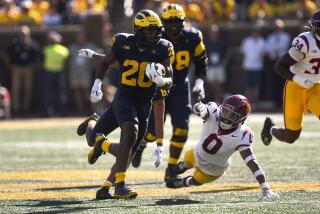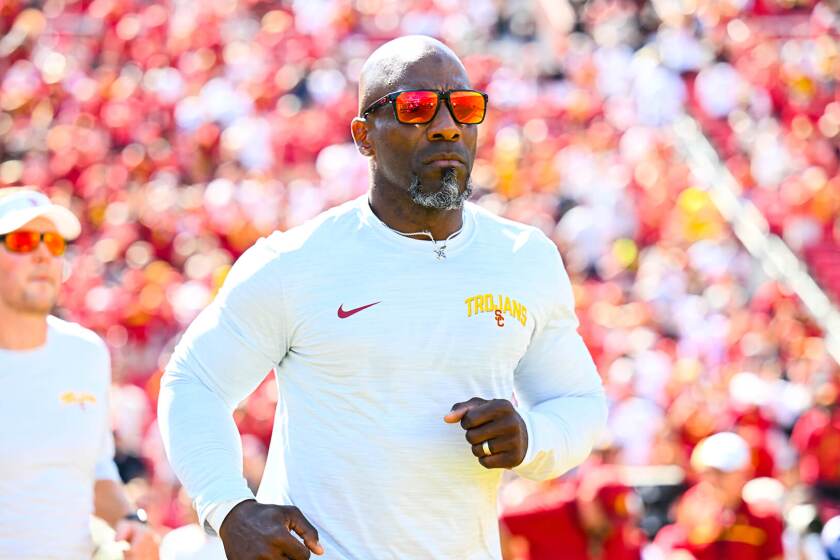USC’s Khaled Holmes knows tragedy and heroism
- Share via
Khaled Holmes earned a degree in classics, so USC’s senior center is well versed in the tragedy and heroism found in ancient Greek and Roman literature.
Ask him which character he most identifies with and the bearded, bespectacled Holmes pauses.
“Most of them are pretty tragic,” he says, laughing. “So I don’t know if I identify with any of them.”
When pressed, Holmes ponders Odysseus. He considers Achilles. Finally, he chooses Hercules.
“With everything thrown at him,” he says, “he found a way to just conquer it somehow.”
Holmes knows the feeling.
On Oct. 4 at Utah, he appeared on his way to becoming a tragic figure before a national television audience.
Holmes’ second snap to quarterback Matt Barkley bounced on the ground and resulted in a touchdown for Utah.
Holmes was penalized for holding on the Trojans’ next snap. And one play later, his mistimed delivery resulted in another fumble that led to a touchdown.
“I was sitting on the bench,” he says, “thinking, ‘Did that really happen?’”
But like Hercules, who maneuvered through 12 labors in one of Holmes’ favorite childhood stories, the team captain overcame his early trials, neutralized Utah defensive tackle Star Lotulelei — a top NFL prospect — and helped lead then-No. 13 USC to victory.
It was a redemptive performance for one of the Trojans’ most experienced players.
And it reminded, once again, that on a team that features Barkley and star receivers Marqise Lee and Robert Woods, Holmes is as important as the highlight-reel regulars.
USC painfully discovered that last month at Stanford. Sidelined because of an ankle injury suffered the week before against Syracuse, Holmes watched helplessly as the Cardinal front seven rampaged through the offensive line and pounded Barkley in a 21-14 Trojans defeat.
“Khaled makes a big difference,” Coach Lane Kiffin says.
At 6 feet 4 and 305 pounds, Holmes casts a large presence on the field and also in the classroom.
When Holmes is not identifying defenses and calling out blocking assignments at the line of scrimmage, he’s designing a mobile application for his master’s degree program in communications management. Last December, he vibrantly played the role of King Theseus in a group reading in the classics department.
“People who don’t know him, they see this Goliath of a guy and think he’s maybe a dumb jock,” says his brother Alex, a tight end on USC’s 2004 national championship team. “Then they hear him talk and he sounds like a poet.”
The Holmes siblings — Alex, 31, sister Theodora, 29 and Khaled, 22 — were exposed to classical literature by their mother, Katina, a classicist who when it came to bedtime stories had no time for Dr. Seuss. Instead, it was Plato, Aeschylus and Homer.
“Everything a man needs to know,” she says, “is in Homer.”
Holmes’ father, Michael, played defensive end at Michigan in 1972-75. He has worked for more than 30 years for the Saudi royal family — Khaled Sultan Holmes was named after princes — and he navigates long separations from his own family by watching Khaled via the Internet.
“My wife gets all the credit for the kids’ education and smarts,” he says. “I’m taking credit for their athletic prowess.”
Though he weighed nearly 12 pounds at birth, Khaled did not appear destined to play football. Too large for Pop Warner leagues, he concentrated instead on basketball and played the cello. Yo-Yo Ma’s performance of Bach’s Cello Suites remains the most listened to selection on Holmes’ computer and mobile devices.
“He’s like a gentle giant,” says his sister, who is married to Pittsburgh Steelers safety Troy Polamalu, a former USC All-American.
Said Holmes: “Everyone in my family says I was a big softy. I kind of got past that at some point.”
At Santa Ana Mater Dei High, Holmes went out for football and played tight end as a freshman. He was moved to tackle as a sophomore and protected Barkley’s blind side before heading to USC, where he redshirted as a freshman and immersed himself in study.
A course titled “The Greeks in the West” led him to explore more courses in art history, language, philosophy, mythology and drama, among other subjects.
“His thoughtfulness goes beyond bookish engagement,” said James Collins, undergraduate advisor for USC’s classics department and an instructor for several of Holmes’ classes. “He’s really exploring the ancient works through every facet of his being.
“He’s very focused on the ancient perspective of what it means to be a strong leader and virtuous person in a struggle — in war, on the field and in the ancient games.”
Holmes, who moved from guard to center last season, has been tested throughout his USC career. He’s endured injuries, the sudden departure of former coach Pete Carroll, the hiring of Kiffin and the NCAA sanctions that prevented the Trojans from playing in a bowl game the last two seasons.
“It was pretty crazy times,” he says.
Holmes, however, never considered leaving.
“Coming to USC was the best decision I’ve ever made in my life,” he says. “I’ve loved every minute of it.”
Even his embarrassing moments at Utah. In the locker room after the game, before Kiffin can address his players, Holmes stands on an ice chest and apologizes to his teammates.
“I want to thank you guys for having my back,” he says, “and never faltering in your confidence in me.”
“You already know it!” yells a teammate as Holmes steps down into an embrace.
“That’s a great example right there,” Kiffin says, “of a real man.”
Holmes is looking forward to Saturday’s game against Washington and the second half of his final season at USC.
For all of his scholarly focus on the past, he also is eyeing an NFL career and life beyond.
So his master’s program focuses on new media, Internet marketing and online social networking.
“It’s a pretty cool combination,” he says.
As is Holmes.
twitter.com/latimesklein
More to Read
Go beyond the scoreboard
Get the latest on L.A.'s teams in the daily Sports Report newsletter.
You may occasionally receive promotional content from the Los Angeles Times.







